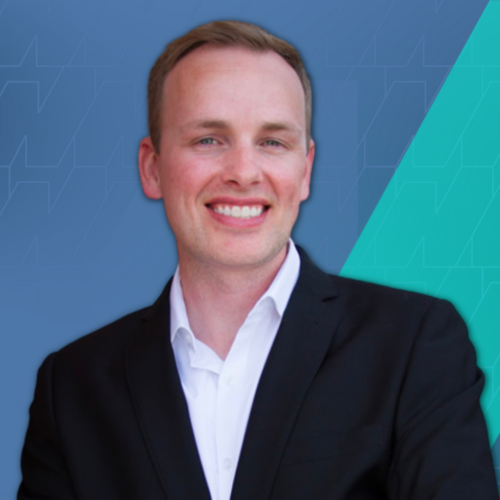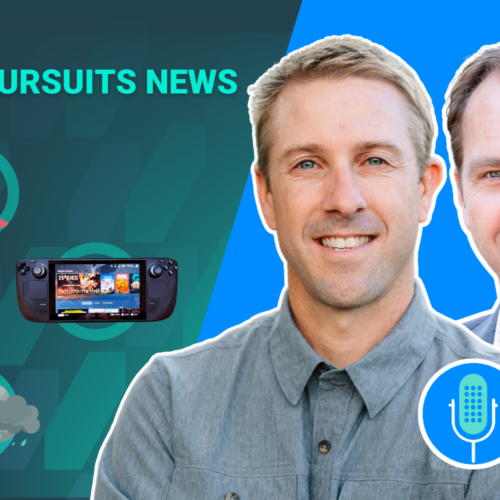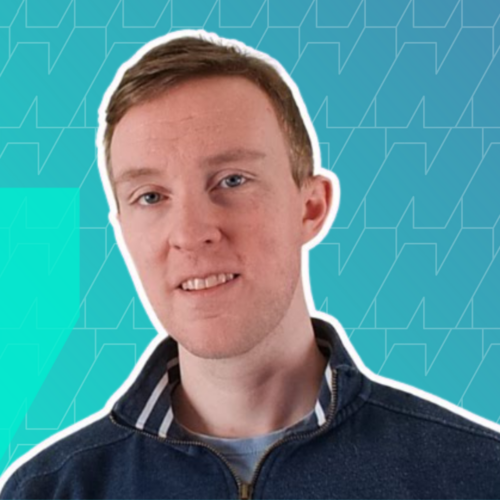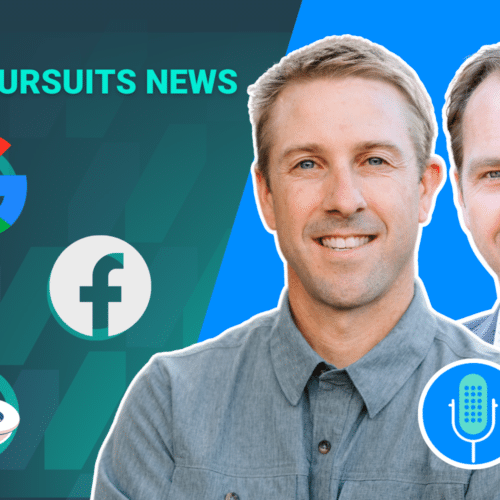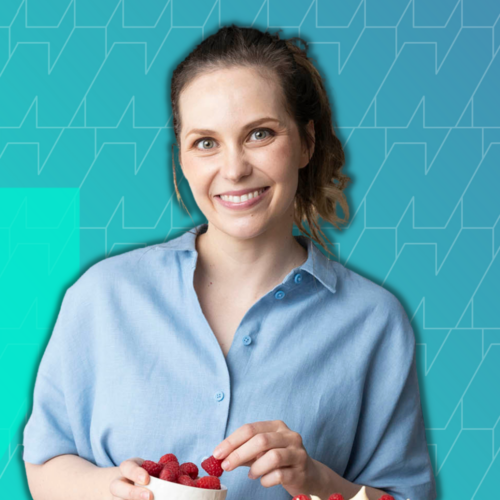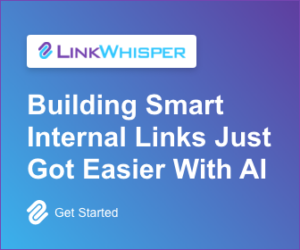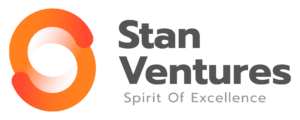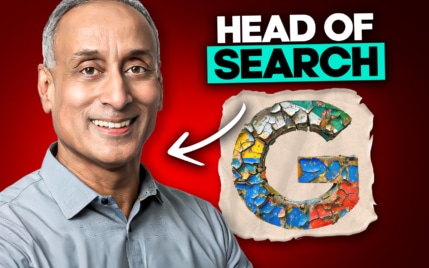How Sarah and Brad Reached $5k Per Month with Great Content and Link Building
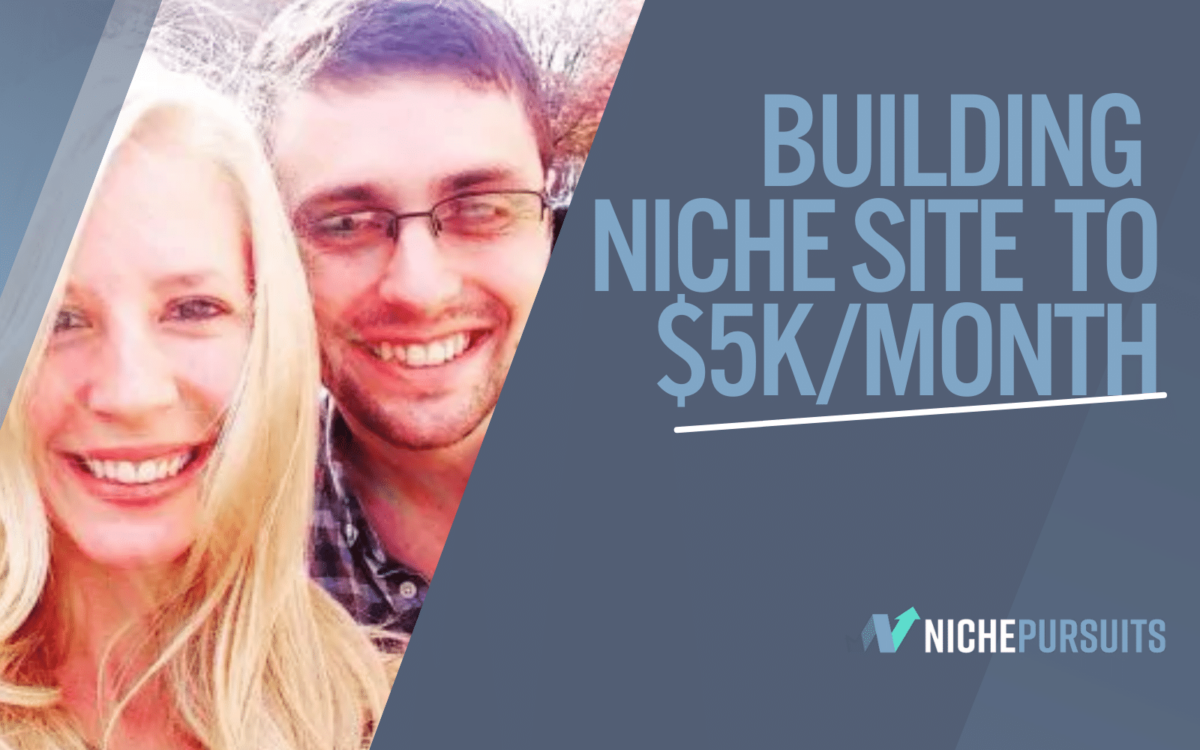
When you buy something through one of the links on our site, we may earn an affiliate commission.
Sarah Stromsdorfer and Brad Stevens join us on the podcast this week.
This couple started their blogging journey in 2016 when they launched their first authority site. They had been listening to the Niche Pursuits podcast for years prior and had dabbled in many ways to make money online, but ultimately decided to focus on a blog in a niche they were experts in.
Sarah is an occupational therapist and so she started the blog My OT Spot with Brad Stevens. The site is all about helping occupational therapists.
In the interview, we go through the journey that started in 2016 and follow it to today where the site is now making over $5000 per month.
Brad and Sarah also launched a second site in 2020 in a more competitive niche. Sarah shares how different this site has been, and they've approached growing that site. Previously they relied upon expert content, whereas for this second they had to take a different approach.
The main difference between the new site and the OT website is that they've had really focus on link building for the new site. They decided to use Stan Ventures link building services, which, as Sarah shares, really accelerated the site's growth.
Watch, read, or listen to the interview below to hear all about this and much more.
This Interview covers a lot of great topics.
- How much traffic their sites are getting (100,000+ month)
- Their current focus on content and updating posts.
- How they are making $5k+ per month – ads, ebooks, and affiliates
- Content Process and using Facebook to find keywords
- White hat guest post outreach process with Stan Ventures
- Growing their new website tamborasi.com
Stan Ventures is offering our audience 50% OFF their link-building services!
Choose DA20+, 30+, 40+, or DA50+ links for half the regular price.
Get 50% OFF Links At Stan VenturesHow Brad Stevens And Sarah Stromsdorfer Grew Their Online Business
Resources mentioned:
- Stan Ventures review – we checked out 3 link building case studies
- Gowp – helps with technical aspects of website.
- Ahrefs – for keywords process
- Upwork – for finding writers
Read the Full Transcript
Jared Bauman: welcome to the niche pursuits podcast. My name is Jared Bauman. Today. We have a great interview with Sarah and Brad. They talk about their blogging journey starting in 2016, when they launched their first site, they've been listening to the niche pursuits podcast actually for several years. Prior to that had dabbled in a couple of.
Online ways of making money from from selling products online and a variety of other other sources, but landed on starting a blog in a niche that they were experts in. Sarah was a, an occupational therapist. And so she started a blog with Brad all about helping occupational therapists. And so we go through the journey that it started with in 2016, all the way up to today where the site is making over $5,000 a month consistently.
And Sarah has been able actually as of just a couple weeks ago, to leave her job and go full-time into the website world, they talk about what they did to get this site to $5,000 a month. And a lot of the mistakes along the way that they made. I mean, haven't, we all made those, but they go into depth about some of those mistakes, what they've done, that's worked and some of the, some of the little secrets, I guess you could say that have made their website stand.
And helped it succeed. They also launched a second site in 2020. And so we talk about how different that site is and how different they've had to approach growing that site. Whereas with their first site where they really were just relying on expert content in their specific niche, this second site is a much more competitive space and one that they realized quickly that they needed to take a different approach.
You need to have great content, but they also needed to put effort into building backlinks. And so we talk about their approach to solving that problem. They hadn't really ever built backlinks before with our first site, how they went about tackling, getting back links and then where that site is today, what they have in mind for the future.
They share a lot of great tips for new bloggers, for people who are about to start a site who are on the fence, they talk about their mistakes they've made and what they would do if they had it to start over again. So it's a great website, a great interview to go along with our great websites and a hope.
welcome back to the niche proceeds podcast. My name is Jared Bauman, and today we have Sarah and Brad Strong's Dorfer. Did I get it right this time?
Sarah Stromsdorfer: Yes. Drum stalker for me, his is easier,
Brad Stevens: much easier, man.
Jared Bauman: We should've just gone with that. I know. All right, well, welcome to the podcast. You guys. Thanks so much for joining us.
Sarah Stromsdorfer: Yeah. Thank you so much for having us. We've been listeners of niche pursuits for probably six or seven years, so we're so excited to be here.
Jared Bauman: Oh, good. So same, same here as well. I've been listening for a long time. When did you guys, do you guys remember roughly when you started tuning into the podcast?
Sarah Stromsdorfer: I think we were trying to look back on when it was, it was probably around 2014.
When I was still in grad school for occupational therapy. And you probably started listening a little earlier than I did at
Brad Stevens: that time. Yeah. We were listening to a ton of podcasts, you know, just pretty much devouring all the content that we could get our hands on and niche pursuits was definitely a really big one.
Those were kind of the long tail pro days and but yeah, yeah. For, for many years.
Jared Bauman: Well, welcome on you guys. Why don't you start by taking the, I mean, I, I think there's, there's obviously a journey here and we're going to get into the specifics of the websites you guys have started and the success you guys have had.
I think it's going to really be relatable for a lot of people today. So I'm excited about the interview, but take us back to 2014 or even circa before that talk us through what, you know, kind of a bit of your journey and what has landed you guys in roughly where we're at.
Brad Stevens: Sure. So I think it kind of started with me and, you know, my desire to find alternative ways to make money.
And then it also kind of stemmed from at the time I was pretty unhappy with my nine to five. You know, I have kind of just a traditional kind of corporate job at the time. And so I started doing a lot of research on, you know, ways to make money entrepreneurial things that you could do. You know, I was listening a lot to you know, real estate podcasts.
And then also, you know, Amazon FBA was really heating up at that time. So that was something that I was interested in. And then miss Seitz was also, you know, something that I, I did a lot of research in and so we actually tried all of those things. So. You know we bought a property to do Airbnb.
We did Airbnb and our own
Sarah Stromsdorfer: condo second bedroom right
Brad Stevens: next to us. Yeah. We have like an 800 square foot condo and it was two bed, two bed, one bath, and, you know, shared bathroom with probably a thousand different people trying to get some extra. And it was great. And so that worked. And so we thought about like, can we scale this up?
So we bought a second single family home, but you know, that proved to be really difficult just because it was really capital intensive. It was time-intensive, there was you know, a lot of issues that you have to deal with with real estate. And then on the Amazon side you know, I was really excited about that too.
We did the whole process. I don't know if people are, you know, might be familiar with it, but you know, kind of decided on a product that we could import found a producer for the product and it was actually fantastic. Believe it or not. And so, yeah. And so we did that for a little while and we were able to generate a lot of sales, but again, it was just, it didn't really at that business model, didn't really appeal to us that much because it was super time intensive, very capital intensive.
And, and the profit margins were just really slim at the end of the day after Amazon takes their cut, you have shipping expenses, advertising and all these other things. So you know, and, and then, so then the niche side. So the first way that we got into it was I, I bought kind of a pre-made website that had you know, a dozen articles.
And I think it was built in, were in WordPress and it was in. The electronic drumming space. And so that was the very first website that you know, I got started with and Sarah was still in school at the time for occupational therapy and I didn't really keep up with it. I was kind of dabbling in different things.
And so that particular website ended up kind of dying off. But then Sarah in kind of the next six months to a year timeframe, she graduated from occupational therapy school and, you know, she knew what I was up to and we talked a lot about it. And she kind of had the idea of starting a website in the occupational therapy niche, because she was always kind of searching for
Sarah Stromsdorfer: things and shaping ideas that I couldn't find.
I was in my clinicals at the end of my program. And I felt very alone with what to do. Treatments and there just wasn't really anything. And then I started my first job. I was the only occupational therapist at the facility and there was still nothing. So I thought, well, there's this lack of content out there.
And I think this would actually add value as opposed to Fanny packs, which there's so many of them out there and not really providing value. So it kind of grew our first website. My IOT spot was just tailored for occupational therapists, new grads and students that really needed those treatment ideas.
And just kind of easy to read educational content, kind of more lists type of articles. Cause we're all exhausted after our clinicals and just need kind of easily digestible content. So it's kind of grown from there as our first site.
Jared Bauman: Let me ask you guys because. It sounds Brad, on your journey at that point, like you guys were really had dabbled a bunch, but really this site you have today, my OT spot is probably one of your F your first or second sites, right.
That you really invested your time and energy in. Where, where were you guys at at that point? When you, when you, when Sarah, you decided yet this idea, where were you guys in your knowledge base and your understanding had you had any successes with online marketing at that point?
Sarah Stromsdorfer: We didn't, we were so new and I'm so shocked that it's worked for us because as you all know, there's just so much with SEO and content marketing.
And I never took any marketing courses ever. And I was just always in the healthcare space, but I find that I'm really interested in entrepreneurship. I've found out doing the site where I was really engaged in learning of what do I do for content marketing? How do I make this engaging? And I think for a lot of people, their first and second sites really.
Aren't necessarily viable for them. So I'm really we always say, now that it's at, you know, the $5,000 a month, mark, I can't believe we did this with our little occupational therapy
Brad Stevens: website. Yeah. Yeah. I would just add that. I mean, we really didn't know anything about You know, starting first of all, you know, starting a business, but then starting something like a website online.
I was confident in my technical abilities just because, you know, I've always been pretty good with computers. I don't consider myself to be like a strong coder or anything, but as we started to get into really building the site on our own, I mean, this was the first site that I actually built from scratch on WordPress.
And it was, it was a relief to see that there, you know, even at that time in like 2015 when we really started building it out there were, yeah. Yeah. So we officially launched in early 2016, but you know, there were even at that time, enough tools that could help non coders, but still people with some technical proficiency to be able to, you know, get a website up and running and get the hosting set up, get painted processing, set up.
And we've always over the years when it comes to like just the technical side of things worked with you know, like administrative, like technical support for usually like $50, $200 a month. And then if we have any kind of like little bugs or glitches, I could always email them and they could help sort that stuff out.
But, you know, for the most part, yeah, for the most part we have you know, just kind of it's it has become like such a passion for us to to try to just learn everything. And there are a lot of different aspects of the business, but I think that's where things like the, you know, this podcast and, and other resources online have been so helpful.
It's just, you know, it kinda just turned into like our hobby between the two of us where we spent
Sarah Stromsdorfer: weekends and evenings. We just were
Brad Stevens: always, we, you know, if we'd had a long road trip, we'd be listening to podcasts, we'd be, you know, working on it together in the evenings and. And yeah, so I think it's just, if you, I think, you know, people are, are brand new to it.
Just having an interest, like a real interest in the space and the passion for making it work. There's so much information out there that you can, you know, be able to teach yourself what to do.
Jared Bauman: So you guys clearly had a good, a good set of knowledge, you know, from listening to niche pursuits and other podcasts and that sort of thing.
Let's, let's, let's, let's rewind to maybe the first year of your blog of my OT spot. Talk through what you guys focused on, what your goals were in, you know, kind of what the first year looked like in terms of action items that you, that you took care of.
Sarah Stromsdorfer: Yeah. So the first year we didn't know anything about keyword research or SEO.
Really. I think I was just writing whatever came to my mind, which some of it did stick and some of it really works, but a lot of it, when I go back and update. A lot of it is just stuff that, you know, people might not even be searching for. So I wish that I had known more about keyword research starting out from the get-go.
I think that is what made it take a little bit longer. It took about two to three years before it became profitable. But yeah, a lot of it was just, this is what I'm thinking about writing about now. And then we would just, I would just share it on Facebook and I didn't do a ton of SEO that first year either.
I didn't know much about Google rankings, I think at that
Brad Stevens: time. Yeah. Sarah was pretty much writing all the content herself. Okay. I'm
Jared Bauman: going to ask you guys, you guys wrote all the content yourselves didn't outsource it. It sounds like with a blog like yours, it's so highly specific to your industry. That makes a lot of sense.
Brad Stevens: Yeah. And, and so I think, you know, we pretty much did everything for the first couple of years. You know, with the exception of some of those kind of like small coding glitches that we needed help with, but yes, Pretty much, right. All the content. We, we had a goal early on to publish once a week and we tried to stick to that.
You know, we didn't always, but you know, at that time as well, a lot of our activities were surrounded around social media. So primarily Facebook and Pinterest. And so I think, you know, most of our traffic early on just came from, you know, Sarah sharing blog posts that she wrote on Facebook and then people would, you know, click over.
And that would kind of be our first little bit of traffic. And and then I think also just to start trying to get the wheels turning on the side, we would reach out to, you know, that there were kind of a handful of other bloggers in this space and occupational therapy. Yeah, yeah. Not many, but you know, so Sarah reached out to them.
Was able to get a couple of small backgrounds that way, but, you know, to be honest, we didn't do a ton of backlinking partly because, you know, we were just so new and we were kind of, we didn't really know the importance of it at the time, but I think just because Sarah really focused on good quality content and because there was just a real need in this particular niche for, you know, the content that she was creating, that it, it took, you know, it took some time, but eventually, you know, we were able to gain traction organically through Google.
And so that, that over time became the biggest, you know, source of traffic
Sarah Stromsdorfer: percent consistently now. And so that's kind of solely what I focus on now. Yeah. I was
Jared Bauman: going to mention, I think that there is you know, for people listening for all of us, especially those that can really dive into keyword tools or do their research based on a lot of that SEO data.
There's a tendency sometimes to maybe pick a new. That is you know, maybe a big opportunity from a keyword standpoint or from a search volume standpoint, but there's really something to be said for going after a niche that you're an expert in that you're already an expert in. And, you know, I'm guessing it doesn't sound like you did a lot of, you know, how much search volume is there for occupational therapy, keywords, or these sorts of things, but you just rely on your expertise to, to push that, that, that site along.
So that that's, I think that's inspiring for bill to hear a lot of us have expertise in our own industry or in something we've developed as a hobby. So that's a, that's encouraging. When did, okay. So when did things start to turn the corner? Like when did you make your first dollar.
Brad Stevens: That's a funny story.
So I can tell you about that. Yeah,
Sarah Stromsdorfer: I think it was maybe I want to say our first year there only a couple of other occupational therapy bloggers, and one of them shared I wrote a review on this one interventions kind of treatment guide, a textbook, or, yeah, it's not, it's not a required textbook, but it's one that I really recommend.
So she shared my article and someone bought one and we made $5 and we were so excited. We went to this little corner like nice restaurant in Atlanta and got champagne for that $5 sale. And it, I think it just showed us that it was doable and it just kind of got me really fired up just to keep going.
And I think that was a big thing where we just knew, even though it took a few years before we started really profiting much at all that we just knew if we kept, if we gave it a few years the traffic was increasing over time. So we saw that, that we that we would eventually make things work.
And then. Once we qualify for media vine at about the two year point. That's when I knew, like this could be a sustainable business for me, where I can leave my job
Brad Stevens: eventually. So where did,
Jared Bauman: Where did it turn from being something that the two of you were, I'm not putting words here. I'm not trying to put words in your mouth, but you know, just kind of going with it and, and whatnot to where you turned and became focused more on the SEO side of things, you became focused more on you know, the different aspects of growing a site like backlinks and, and SEO research content with keyword optimized.
When did that, when did that start to happen?
Sarah Stromsdorfer: I think it was, do you think probably a year or two or so once we, we kept listening to a ton of podcasts and courses about SEO. So I think once we started really getting to know probably second
Brad Stevens: year SEO, probably the second year we started taking. More seriously.
Sarah Stromsdorfer: And then we S we found some other occupational therapists on Upwork and have them help us write content. So we were able to scale up better then, because after a while, when you're working in the field, it's, you know, it's exhausting to come home after, especially a couple of years of doing it. It's doing the research when you get home is hard.
So having that extra help was huge and growing it too.
Jared Bauman: That's great. So fast forward to today if you're comfortable sharing some of the stats of the website, how much it's earning a month, we've already kind of danced around that a bit, the traffic, monthly traffic you know, share some of the details about where you guys are at now.
Brad Stevens: Sure. So traffic wise,
Sarah Stromsdorfer: it's been a bit lower this summer with COVID, but we're
Brad Stevens: still, yeah, it's kind of in between like a hundred thousand to 120,000 page views per month. You know, users is usually a little bit less than that, somewhere around 80 to 90,000. And then from a revenue standpoint we've been doing this is, are definitely you know, our best year.
So far in 2021, we're averaging $5,000 a month. And so some months have been a little bit better. Some months have been a little bit slower. The summer, as Sarah mentioned has been a little bit slower. I think people had the first opportunity to get out and get off their computers. And so, yeah, yeah.
Which is, which is totally fine. But yeah, I think those are kind of the two, the big, you know, data points. We also have an email list that we've just slowly built over time and there's about, I think, close to 10,000 subscribers on that email list. And then from a content perspective, we're up to, I think 230.
Pieces of published content. And so, you know, over time you know, early on probably the first two, three years, we were really aggressively trying to add new content, write new content, outsourced newly written content. And then over the past probably year and a half we still do want to add really high quality content as much as we can, but Sarah has also shifted some of her focus to updating the existing content that now is from 2016, 2017.
And so she's done a lot of research on that and that's proven to be really helpful in bringing those old posts back to life and getting more traffic to those ones.
Sarah Stromsdorfer: Another thing growth wise that I'm really excited about now, I only have about a week left in my clinical positions. So I'm really excited to, this is the first time that I've actually been full-time on the website or the first time I will be full-time.
So I'm really ready to ramp this one up as well as our second website. So I'm curious to see what kind of growth we can get with that.
Jared Bauman: Wow. So congratulations on the income levels, the traffic laws, and congratulations on going full time. That's ma'am we, we caught you at a good time.
Sarah Stromsdorfer: I know, I guess,
Brad Stevens: perfect timing.
Jared Bauman: That is good. Okay. How's the how's the, how's the revenue split. You talked about media vine ads. So obviously guys are monetized with an ad network, a really good one with, with media vine. I have a side on media vine as well. They're fantastic. And you spoken a little bit about affiliate income.
I'm curious to hear more about, you know, how does that 5,000 come through to you guys on an average monthly. Sure.
Sarah Stromsdorfer: Yeah.
Brad Stevens: Yeah. I'm kind of the numbers guy since that's my background. So yeah. So media vine makes up about 50% of that. Usually, and then on the affiliate side, our biggest affiliate relationship is with a continuing education company called NetBridge and
Sarah Stromsdorfer: they're online continuing ed, which is great, especially
Brad Stevens: now.
Yeah, so they, they offer a really good product and they have a pretty decent, you know, affiliate program. That brings in, I think, around 20% of that revenue. And then another, probably 20% is from eBooks. And basically, so Sarah early on, probably in the year two or three wrote a couple of e-books that were, you know, specialized on certain treatments and occupational therapy.
And so those have been pretty steady and consistent over the past couple of years. And so that's again, kind of 20%. And then I think that's, that gets you to 90% and then there's another, yeah, there's another kind of the last 10% comes from a handful of other, you know, it's affiliate income. So some of that's Amazon, and so there's, you know, some posts that will refer people to products that are relevant to occupational therapy.
Things that they would, you know, you'd use on a daily basis to help with patients
Sarah Stromsdorfer: that have medical references, things like that. And
Brad Stevens: then other people in the occupational therapy space have kind of created their own products. So similar kind of like eBooks or guides or, you know, subscription programs that teach people how to do better in occupational therapy.
So that's kind of the last 10% of that revenue. And, and, and the nice thing I think I mentioned, you know, early on just about, you know, some of the really slim margins and other businesses that we've tried. What's great about the, you know, niche sites is that the margins are great. I mean, we, you know, it's probably 90% margin are in terms of profit margin.
And so, you know, our expenses every month really just come from hosting. We have the, you know, the, the, these guys called go WP that helped with the Technical side of things. And then, you know, our, we use stock images. And so that's probably 30 bucks a month. And then any, yeah. Any content that Sarah hires out you know, that's an expense, but I think that's the thing that we really love about, you know, niche sites, just the profitability is great.
Yeah. Yeah. Yeah. Oh,
Jared Bauman: well, that's great. I think a lot of people are always curious about how to move their affiliate revenue and diversify. Maybe not all the way off of Amazon, but certainly adding on new affiliate partnerships like that. And again you guys have done a really good job of finding some affiliate partners and that continuing education idea is actually really interesting.
I bet it would apply to a lot of niches, not just the occupational therapy niche, you know, I bet there's a lot of different niches out there where there are continued and continue on secondary education. That would be a good referral opportunity for, for different niche owners. So that that's, that's a really, that's a really cool tip.
Sarah Stromsdorfer: Yeah, a lot of industries require it. So I'm sure they have affiliate programs.
Jared Bauman: Let's sound, let's talk about your content process. I'm curious to hear, I mean, 230 articles, that's a, that's no easy. I mean, that's a lot of articles, right? So you talked about kind of how, in the beginning you were just writing topics that kinda came to mind is something you thought was applicable or relevant to to occupational therapist.
What is your content process look like now? How do you guys find the topics? How do you write them? That sort of thing. Talk us through that.
Sarah Stromsdorfer: So right now I'll do, I'll use H reps quite a bit, and I'll also see there's several very large Facebook groups for occupational therapists. So I'll notice what's coming up a lot in questions because there might be keywords that H reps just doesn't know.
Yeah, that people are searching. So kind of do a mix of those two. And then whenever I, if there's a student coming in at my clinical setting, I'll ask them, Hey, what's the big thing that you're looking for on Google that you can't find? So I kind of use that too, just because even if it may be only gets 50 searches a month, it could still really help someone out.
But the HRS keyword research is really helpful and that's kind of really helped us to see some different ideas that I might not have thought about for what people are searching
Brad Stevens: for. And Sarah also just has a really good pulse as she kind of said, like on the OT community, You know, we have a Facebook group that has, how many members is it now?
Maybe
Sarah Stromsdorfer: 3000. Ours has about 6,000. But I like to check out the groups that have, you know, 30, 40,000 people that are really active and engaged, especially with a lot of students to see really what they're, what they need and what they're asking about. I think that's been a really, that's probably about 30% of our content, even if it's not showing up on a keyword,
Brad Stevens: just yeah, just, you know, seeing what people are asking questions about what, you know, there might be some new ideas that are out there that is that people are talking about.
You know, one topic lately, especially during the pandemic has been like alternative career paths outside of working in a clinical setting. That's kind of a more popular topic, but yeah, so that's kind of how Sarah is really she's the subject matter expert. She's the occupational therapist. Really gets things going on, you know, the front end of understanding what people want to be reading about.
And then from there, Sarah, I think more lately in the last couple of years you've been hiring writers and you still been writing.
Sarah Stromsdorfer: So at this point, maybe I write about 60% and higher at 40% because I'm very particular about my content. Quality and OT are great at writing, you know, school type of papers, but they're not as great necessarily for SEO and marketing.
So I find for me, it's just kind of faster to write it and format it the way I like it and the way readers like it and the way Google
Brad Stevens: likes it. I mean, just on the topic of hiring writers I think Sarah has worked with a lot of you know, a lot of different writers over the years. And, and that's one thing that I think she's found that you really have to be patient with it, especially.
You know, using people from there's different services out there, people might be familiar with. I think Upwork has ended up being a really good source work for writers for Sarah, but it can be time-consuming, you know, not, everybody's kind of getting people to understand the, sort of the tone and the voice that you're looking for, even the formatting and just getting the content to the level of quality that Sarah's expecting can, it can be, you know, it can be frustrating at times.
And, and there's definitely been some content that she's paid for that just ended up not really being very good. And so she either won't use it or she'll end up having to rewrite it a lot. But I think, I think the biggest thing is, is just, you know, realizing that it's still definitely worth it to take the time to, to, you know, find writers out there to help scale up your content.
Because after so many years of writing content, your, you know, your time might be better spent doing other things, but just kind of being prepared to have the patients to work with. You know, you might have to work with a lot of different people to find somebody that really, you know, first understands your niche really well.
But then also is able to actually write the, you know, high quality content that makes sense, and that's engaging. And that, you know, your, your readers are really looking for,
keep them
Jared Bauman: happy. How, how when you talk about finding writers on Upwork, how important in your niche have you found it to be, to maybe hire an actual occupational therapist, to do your writing versus just hiring a writer who can research and write about the topics that, but that might not have that expertise?
Yeah,
Sarah Stromsdorfer: it's extremely important. I learned, I did try hiring a couple of non OTs A physical therapist at one point and a speech therapist were having similar domains. And then I hired just a standard writer. And even with there being the ability to research the topics, it's just basically impossible in this niche.
I feel like to really know what they're talking about, unless they're an occupational therapist. So that is why this is a hard niche to outsource. So we say, you know, if I ever sold it, who would buy it and who would, you know, they would have to have an OT run it, right. Have to have OTs write for it because you can certainly tell when a non OT is writing the content.
Unfortunately, it's
Brad Stevens: very special. That's good and bad.
Jared Bauman: That's good and bad. It's difficult to scale for you, but it also makes it so that you have quite a substantial amount of expertise on your site that is hard for other people to, to mimic and to duplicate. So. No, let's talk about let's talk about any backlink strategies you guys have taken along the years with this site.
We haven't talked about backlinks yet. We've talked about content, Brad, we've talked about a lot of your work on page and getting the technical side of the site, but what have you guys done for any sort of backlink strategies over the years?
Sarah Stromsdorfer: We were not great with backlinking for my empty spot. And I remember Spencer had a woman on the podcast years ago, how she did no backlinking and it worked for her.
And I just remembered, I was like, if she can do it, then I can do it. I know. It's like, it just seems so doable. But so we did do a little bit of backlinking, but nothing. Concrete. We did a few guests posts in the very beginning. Then we started using heroin or help a reporter out, but very inconsistently and we did get a few backlinks from them, but it just was not, I really wish we would have earlier had an actual project and it had an actual idea of what we needed to do for links.
And I wish I knew how important it wasn't. I think it would have scaled us up a lot faster if we knew that we should have been doing it a lot more consistently.
Jared Bauman: When did you guys start you talked about Herro you talked about guest posts. Is it something that, you know, you've, you've since gone on to build more backlinks or have you really just kind of relied on a few links here, a few links there and grown the site based on the other aspects, the other attributes of it?
Brad Stevens: I think it's never back leaking with Maya T-SPOT has never been like a huge, you know, I guess part of our day-to-day focus, I think more so, you know, our, our primary focus is on. You know, quality content, at least that's true for Maya T-SPOT. Tim Rossi is a different story because it's our second, our second west side, we can talk a little bit about, but we started that in April, 2020, and we quick, quickly realized that backlinking was going to be a much more important of our, you know, part of our just regular ongoing work and our strategy to be able to.
You know, get people to the website. So with bigger niches,
Sarah Stromsdorfer: it's kind of, it's mandatory. I feel that you have to do backlinking and you have to get that going sooner than later.
Jared Bauman: So as the April 20, 20, 20 20, so we've got our pandemic site here. I am. This is the lockdown site. This is the Netflix, or build a new, a new site, a question mark here.
Right, right.
Brad Stevens: It's one or the
Jared Bauman: other, we're going to watch Netflix for the month or we're going to build a new site. So well, before we transition to that second, I want to talk about that side. Cause you guys have some interesting parallels and observations. What is next for my OT spot? What are your, what are your goals and plans?
And I mean, we hit, we're hitting you at a really interesting time because. You have this milestone revenue that you've accomplished. And at the same time, Sarah, you're going full time while you're leaving your full-time job. I presume going full-time into, you know, into the, the websites, but what are your goals going forward with this?
What are your plans for the site?
Sarah Stromsdorfer: I just really curious, like once we hit this 5,000 mark, it just felt so huge and we didn't think we would get this far since it's a smaller niche and there's a lot fewer occupational therapists and there are general public that are using Google. So I'm curious to see if I can publish, you know, two to three times the normal amount that I was, how high I can grow it.
We're having our first child next March. So it would be great to have just, you know, a little bit extra income stability with that. But it's just, it's interesting since it's a smaller niche, we just don't know how much higher we can get it without doing a membership site, which is very time intensive.
It's very profitable with my competitors. I like the really passive aspect of it. So I'm trying to just kind of see what we can do without doing membership sites are very large
Brad Stevens: horses. Yeah. I think, you know, for us, we kind of PE people have their different mindsets when it comes to, you know, building websites and entrepreneurship.
I know there's a lot of people that are really have huge aspirations as far as, you know, how much money that they want to try to make with their websites. You know, they want to try to grow to be six figures a month, which obviously that, you know, of course would be amazing. But I think with Maya T-SPOT.
Probably not realistic, especially with this niche. And so I think, you know, our mindset with it is, is a little bit different. It's one where we, you know, we view it as it's something that we, we view that the, you know, the website between the content and all the organic backlinks and all the organic traffic and just the reputation of the brand name that we have with the website is, is solid.
And it's, so we, we believe that it's really built on a solid foundation. So that's just is valuable from a standpoint of being you know, reliable. And, you know, we know that we're going to get a certain amount of traffic every month. And we know that based on, you know, however many views that is, it's a certain amount of ad revenues, certain amount of, you know, affiliate revenue.
And so I think that's, what's most important. You know, there are a lot of people, especially in the, you know, make money online and kind of like niche websites, space, Have have really high aspirations, but I think, you know, for us, it's, it's really about when it comes down to it. You know, kind of a tool to enable a lifestyle that's really desirable for Sarah, especially now that yes, she mentioned she was able to, you know, leave her full-time position in a clinical setting and be able to just focus on, you know, things that are more important to her having less stress in life.
And so I think that's kind of the longterm way that we're viewing the website. It's just as a reliable source of income for our family.
Jared Bauman: Well, congratulations on the upcoming arrival. That's wonderful. So even more impetus to to, to. Transition, you know, your, your lifestyle and let this let this website work for you.
That's that's wonderful. Let's speaking of transition, let's, let's talk about the site, the second site let's transition to the second site. You guys started a vastly different niche, and obviously you've talked about the different challenges or you hinted at the different challenges that are before you in this one.
What's the you mentioned the new site. What, what space does it in and what, what kind of what kind of readers is it targeting?
Sarah Stromsdorfer: Yeah, so our second knit, it is very different from occupational therapy. It's tambour asked me.com, which is the it's the smallest river in the world, kind of a play on Amazon being the largest river and very kind of consumerist.
It's all about sustainability, which I've been passionate about for years and love talking about with everyone, especially now with how things are going.
Brad Stevens: Yeah. So it's, it's really, it's in the Sarah mentioned sustainability and you know, environmental ism, you know kind of just conservation giving people different product ideas
Sarah Stromsdorfer: tips to
Brad Stevens: consume that just ultimately, you know, maybe less harmful to the environment.
And, you know, I think that there's kind of two parts with respect to climate change and global warming. There's kind of the personal side of things where I think Sarah is really passionate about. Products that again are just kind of like less harmful, less impactful, better for the environment, more, you know, trying to reuse things, re and, and and, and, and consume less as much as possible.
And then the other side of it that we're, I think going to try to build out as well as just more content around sustainable technology and energy and
Sarah Stromsdorfer: holding companies accountable as well, because that's a huge, we've learned a lot in this space now that it's just a lot of it goes on the company.
Isn't the consumer, can't be the only ones that are responsible for making these
Brad Stevens: changes. Yeah.
Jared Bauman: And so what's the how's it going so far? You guys are, I guess at recording here somewhere around a year and a half fan or so. So, you know, kind of early days, but talk us through how it's going so far and what you've done.
Brad Stevens: Well, it's it's been going okay. We've been, I think, pretty good and consistent with our creating content. And so this is a niche that's a little bit easier to find
Sarah Stromsdorfer: sustainability.
Brad Stevens: There's more, yeah, there's just a way bigger niche. So that's helpful to be able to find more writers. So we have about a hundred pieces of content and you know, the one year mark was April.
And so we have a lot of content. It's definitely been. Slower. I think the ramp up from a traffic perspective,
Sarah Stromsdorfer: despite doing keyword research with a low competition,
Brad Stevens: I think it's just, there's just, you know, it's a lot of competition in this niche. And so our traffic, I think, is in, you know, the 1000 to 5,000 page views per month.
And so it's growing. I mean, you know, it's very slow but steady we're, we're, you know, kind of, we're trying to be patient with it. And we, cause we know that at a certain point we'll really start to tick off and that virtuous cycle will, will start to kick in where, you know, the more. Page views, you get the more organic, you know results that you can show up for in Google.
And so that's kind of the state graph. We, you know, from the biggest thing I think we learned from Maya T-SPOT is just that building a website can take a long time. So you really have to be patient with it, even if we're not seeing, you know, some of the results that you might hear about in six months, people are making thousands of dollars and I know that's all possible, but in this particular niche that we're getting into, we know that it's something that, you know, we care a lot about and we want to just stick with it for the longterm.
So for us you know, year, two years, five years, however many, however long it takes, I think we're, we're willing to just stick it out and keep working on it. And and, and we know that it's right now, it can be sometimes a little discouraging cause the traffic numbers are low. But again, I think it's just knowing that it can, that we can be successful from working with Mio T T-SPOT and just knowing that it can take a long time to really get that traction.
You
Sarah Stromsdorfer: just have to be patient in our society.
Jared Bauman: It was advocate actually. I mean, first off a lot's changed in SEO since 2016. When you started my OTs. It's, you know, it's a, it's a vastly different environment. And I think we saw it firsthand with Spencer's own the yard.com case study and project that I don't have the numbers off the top of my head, but I feel like it was between the 18 and 24 month mark before he started actually seeing, you know, some real solid growth.
And you know, previously it would take sites six months to come out of the sandbox and really, you know start generating a lot of revenue. And then that started taking 12 months. And I mean, I don't have any data on hand, but it sure feels like it's definitely longer than 12 months not to start ranking, but to start getting that real traction that you talked about.
And so, you know, the devil's advocate says maybe you guys are very close in terms of a normal timeframe for websites to get going in terms of sustainable traffic in today's environment.
Sarah Stromsdorfer: That makes me feel better because yeah. You have that six month mark in your head of, oh, that's how long Google takes and it's, it does seem definitely longer now.
Jared Bauman: Well, you talked about it's a more competitive niche than the, than your, than your occupational therapy. One. What are some of the strategies you guys are trying to go after to tackle this competitiveness? What are you doing differently with, with your sustainability site to try to rank and outrank some of the more competitive terms?
Brad Stevens: We, yeah, I mean, I think first and foremost, the most important thing to us is just the quality of the content. And so, you know, we're using a lot of the same strategies that you know, we've used on my LTE spot. Just kind of keeping a pulse. You know, what's going on in the industry, but then also I think a lot of our content is, is oriented around you know, evergreen topics that aren't necessarily news oriented, but things that can, that will stick around and be relevant for years to come.
But I think also
Sarah Stromsdorfer: keyword research as well from the get go,
Brad Stevens: which we didn't do a lot of keyword research. And I think a really big part of our strategy now just as far as backlinking goes, is outsourcing backlinking. Because I mean, as, as you've kind of heard, it's not something that we with Maya T-SPOT took very seriously.
We didn't spend a ton of time on it. You know, we knew that it was important, but I think we just not, we, it was hard for us to be consistent. I don't, we don't, you know, it didn't really love doing it. I know a lot of people struggle with it. It can be tedious, but it's one of those things where we know we're, we're good at content.
We're, we're good with. Our content process and really getting the content to a high level of quality that we just realized that, you know, backlinks is super important just with how competitive it is, but it's not something that we wanted to be managing on our own time. So that's something that we've started outsourcing in the, in the, in the past kind of gear.
Sarah Stromsdorfer: And that's really helped us just having it regularly done every month has been, I think, a game changer, even though we're seeing small traffic increments, we were seeing nothing when we were just doing heroes. So that's been that's been really great and I think that's something we'll continue doing as well.
Jared Bauman: Okay. Talk us through how you decided on, you know, a backlink company to work with, what, some of the things that were important to you what type of backlinks you're building? I'm sure everyone would be really curious.
Sarah Stromsdorfer: Yeah. So we actually got an email from Spencer's list with a company called Stan ventures.
And I started researching them myself before. Cause I, you know, I was telling Brad, we need to do something about this backlink thing. We need to do it and we're not going to do it. So I saw that they had good feedback and that they were white hat. That was really important to me that it was all going to be white hat, so I wouldn't get penalized ever.
So we started using them a few months ago and day basically reach out to other sites with different domain authority. So I think right now we're doing one domain authority of maybe 21 to 30, 40, and maybe then there's a couple extra that are in the 20 to 30 domain authority range targeting. They targets are specific, just a few articles per month that need to, that have potential to rank.
And that's really helpful that it's cause I before with my OTs, but we would just share our main link. We wouldn't do individual article backlinks. So they've been doing that outreach for us, and we've been seeing results every month they also, which is helpful. They send kind of a PDF package of the growth that our posts are getting and just seeing that results like, okay, backlinking, it is very important.
We need to keep doing this.
Brad Stevens: And with that, we were able to get there's one page in particular, we were able to get to a, a number one ranking on the first page of Google. And so that, I think that's, you know, by far probably our, our biggest traffic generator and Yeah. So I think, you know, what we, like as well about working with them is that the backlinks are, are all sort of guests, posts oriented and they're really great to work with because they will, you know, come up with a list of ideas for websites that we can partner with.
And we can, we can kind of review it. And sometimes we say, I don't think this really fits with, you know, our niche maybe sometimes or yeah, this is, you know, it could be like, perfect. Like this would be great. We'd love to be able to work with this particular site. And so we can give feedback on that front and then, you know, they'll handle the communications and sometimes, you know, we don't hear back and sometimes it might not end up working out.
They always will, are really good about following up. I think that's been the biggest thing. That's it can be hard to find just in follow up in any aspect of life, whether it's business or personal or anything, it's just people don't always have very good follow-up, especially when it comes to emails. And so that's one thing that we really appreciate is that they have, you know, they can take our feedback and run with it.
And then even if, you know, there might be a site that changes their mind or whatever, they're always following up with us to find another one and to make it work. And that's just been huge because I mean, that's the kind of stuff where we need the accountability to be able to continually build links, because if, if we were to do it on it, it wouldn't happen.
Jared Bauman: Yeah. But I think it's fascinating to see that you guys have succeeded on your first site without much of a backlink. But yet have been so quick to identify the competitive competitiveness of this niche and your new site, and then to make a decision to go out and solve that problem. You know, that's it's easy to get into trap, I'll say trap, because it sounds like it would be a trap for you guys to approach this second site in the exact same way that you approached your first site, you know, which is, ah, we've relied on great content and, and whatnot.
We've analyzed this site and seen it. It's a much more competitive niche and then tackled it with a strategy that should help bring you guys on par with some of the more competitive spirit people in your niche, which is a backlinks process.
Brad Stevens: Yeah, absolutely. I mean, I think that it really boils down to, you know, three things to, to ultimately I think be successful with, with websites and you know, that first thing is having really good quality content.
And so I think we've got our process down for that.
Sarah Stromsdorfer: And again, you can have the quality content, but
Brad Stevens: it's quality content and then it's yeah, it's it's you can't just write stuff in and let it sit out there and ether on the internet and expect people to see it. You've got to figure out ways to get, get that content in front of people.
And there's a ton of different ways obviously, to do that. There's social media, you know, Facebook, Pinterest, Twitter, there's Pinterest, not really Pinterest anymore, but you know, email lists that you can tell people on the street that you see about your website, you've got to get, you've got to have a means.
Getting eyeballs to your website. And so that's the second part. The third part, obviously that we've talked about just being patient and giving it time. So we've got the content covered and we've, and you know, we have the patients to make it work, but we really are, are trying to dial in and build up our process around getting people, getting users in front of the website.
And so backlinking, I think is just such a huge part of that part of you know, the, the puzzle for us to get the second website to work.
Jared Bauman: That's great. That's good advice. That's good feedback too. Let's let's let let's, let's kind of circle the wagons here. What what would you say are some of the biggest mistakes that you guys have made along the way?
Obviously this is geared towards everyone listening who's on the journey as well. What are some, maybe, maybe a mistake you made that you learned from that you can share with them?
Sarah Stromsdorfer: I think I would have loved to have known more and I, you know, I can't go back. I would have loved to research more ahead of time about keyword research and back linking and SEO instead of just spending almost two years, just throwing content out there and not knowing.
But I think now, you know, there's so much helpful information on the internet to learn this ahead of time. It's really helpful to know as much as you can before you get started or kind of while you're getting started, just really, really focused on maybe even doing, I didn't do it course ever. And I wish, I think if we would have done one of the courses we've done since that we would be more on the right track
Brad Stevens: earlier.
Yeah. I think that we, you know, we've tried to monetize in different ways that have not been successful at all. I mean, for example you know, we tried to sell physical products on the side, like
Sarah Stromsdorfer: t-shirts
Brad Stevens: t-shirts and totes and handbags and things like that. But I think, I mean that it's basically, some of the products are still up, but it's really been almost like zero, you know, nothing.
We should probably just take those
Sarah Stromsdorfer: down, but they're not looking to buy things when they're looking for
Brad Stevens: yeah. Knowing your audience, but also I think a big part of it is just not being afraid to try things, you know, for us, like, you know, we've, we've tried a lot of different things. We've tried a lot of different writers.
You know, we've tried a lot of different ways to monetize that haven't always worked, but just being willing to give it a shot, I think as long as it's not, you know, too high risk of you know an endeavor financially, you know, I wouldn't, I think that you know, for us, from, from a stamp. Just experimenting with the website, you know, trying different plugins, even for example, I think one of the big things that's helped our site on my T-SPOT is just having a page that shows all of the content for the website, just in one place.
Cause we didn't really have a good way for people to search tool. We didn't have a great way for people to browse content, but just, you know, experimenting with, with different things. Yeah, at an incremental level, I think we've seen some, you know, stories of people that have done complete site redesign and that has just been awful for them because it can really hurt you if you're trying to do too many things that are too big all at once.
But I think our, our way of just trying to do, you know, small things that aren't too risky and just doing incremental improvements, some things are just not going to work at all, but other things that work. Figure that out and keep keep going on those things and keep growing.
Sarah Stromsdorfer: And one thing I always tell people whenever they're new or interested in starting a website is just to not give up because I've talked to so many people and whether it's a therapy space or they're interested in other niches and they start the websites and they even make a couple of articles and they just give up.
I see that time and time again. And I just tell people, if you really are interested in this, just you have to keep going.
Jared Bauman: Look, I'm curious, looking back at the articles right now on my OT spot that are, that are ranking, that are bringing in the majority of the traffic, where these articles that you wrote without a keyword strategy, where they articles that were, you talked about how heavily researched some of them were in a refs.
And when you went and looked others that you've written have been really just very topical with irrelevant that you don't even care about the search volume, but you know, now from from different Facebook groups and stuff that they're relevant, like your top articles, which where put the buckets they fall into, a lot
Sarah Stromsdorfer: of them are articles that weren't on keyword research tools, a lot of treatment ideas.
So with occupational therapy, working with adults with different deficit areas, if they have a deficit in balance or endurance or strength, just little functional ways that we focus a lot on self-care and retraining functional. So just articles on different deficit areas functionally have done really well.
And so we kind of try to keep that going to whenever I can think of new intervention ideas and on Google, you just want to see that if you're searching for occupational therapy treatments, there's a lot of pediatric content, but there weren't really any keywords for adult based treatment ideas. So I still think that's really interesting that that really worked
Jared Bauman: out.
Yeah, I do too. I think it's I think in many ways, part of your success might actually be because you didn't understand some of the tools as well in the beginning, which allowed you to write about topics that others weren't writing about because they were using the very tools and you were using other knowledge sets to produce content.
So I could be wrong, but I was curious about that and it does sound like at least some of the articles you guys have that are really successful actually don't even really come from a classic keyword research.
Sarah Stromsdorfer: Yeah, I think that could be right. And maybe now I would switch kind of advise people to encourage, not only to use keyword research skills, but also write about what you think people need for your niche.
And I think that's always going to be helpful anyway, especially if it's not out there on Google, it would be a lot more helpful for your reader. And that
Brad Stevens: probably comes with time as well. I think early on the, you know, the keyword tools are super, super helpful to just get an understanding of you know, from a traffic perspective, what are good topics to go after.
But I, I do think, you know, since we've been doing it longer, we might have a better feel for. You know, as something that might show up in a keyword tool that, you know, we just knowing the niche and knowing the content that's out there and knowing our content, just knowing that that might not really be something good that, you know, to go after.
And then on the other hand, there might be a topic in mind that Sarah has that it doesn't show up anywhere on the keyword report, but just, she knows by knowing the niche and knowing what's out there that that is something valuable or at least it's something that's worth trying. Right. Right.
Jared Bauman: Oh, it's just so interesting.
So what's so for people who are on the fence about starting a site for the segment of the audience, that's listening, that hasn't started a site yet is in the stage of listening as you guys were from 2014 or so to 2016 or so it is in the stage of, of, of, of learning. What would you say? What would you recommend to them?
What would be some advice you'd share with those people who haven't started yet?
Sarah Stromsdorfer: There's so much.
Brad Stevens: We always anytime we get, you know, friends or family that show even the slightest bit of interest in starting a website. Yeah. We'll, we'll, we'll just both start talking to anybody off because we, you know, we have learned so much, but I mean, I think it would just be, I think the most important thing is to, just to really, you know, understand that this, this can work for, you know, just normal people.
Yeah. For any niche, you know, we, we're not like some, you know, huge, like I said before, we're not doing like six figures a month or anything like that. We, you know, we're just at a point of revenue and income that is realistic. That's, you know, sustainable and reliable. And so I think that's the first thing.
Cause I think, I think the hardest thing, you know, that we've seen for people getting into this niche of, of making websites is. Is not really, you know, believing maybe partly believing that this can work or just having skeptical of like the things that you hear online that you hear about all these success stories.
But, you know, you don't always hear about the failures because there certainly are failures. But I think that just, I think knowing that it is possible to, to make this work and to make this be successful to a realistic degree is just something that's so important because with that, you know, with that belief that, that it can work if I just put in the time to put in the effort and just have patients that knowing it can take years to get it to work, that will keep your enthusiasm and your drive and, you know, your passion for learning about all the different aspects of, of, you know, building websites.
Because there are, there are a lot of. Parts to it. You know, from SEO to hiring writers and, you know, sitespeed, and, and, you know, marketing and all these things. You really, I think just having a belief that it can work, I think helps drive your enthusiasm for learning more and more.
Sarah Stromsdorfer: And another thing I think you should be pretty passionate about what you're going to be starting a website about, unless you plan on just outsourcing everything right away, because it's, you're going to be immersed in that topic.
And if it's something like electric drum or electronic drum sets, that would be something I wouldn't, you know, I would give up on right away. But if it's something you're passionate about, even if it's something like needle points and you love to write about it I think that really helps us to have a topic that you enjoy, whether it's, you know, cooking or.
Crafting or you're not clinical expertise, but your career expertise, something that you could stick with for years, because it can take years to get traction.
Brad Stevens: I probably would agree. I think that is for us. I think that's the most important is, is knowing that this is a topic that you can, especially, it's a topic that you really are passionate about, that you could see yourself writing about and talking about and thinking about a lot for years to come especially kind of as we've, as we've discussed it just over time, you know, it, it does get harder and harder.
It's a little bit harder now than it was five years ago. And it's going to be a little bit harder, most likely five years from now and so on and so on. And so I think that's most important. I think it also is important to consider, you know, the, the competitiveness of the niche. You know, you obviously don't want to go for something that's just way too competitive.
Yeah. I mean, you, you, you just, but you just have to kind of be realistic that if, if you're, if you're, yeah. If you're trying to go into you know, hosting services or, you know, if you're really onto fitness or Trek or travel blogging, I mean, just, just know that those are, are going to be way more competitive, but I do think that's I do think the level of competitiveness of the niche is probably secondary to your level of passion and enthusiasm for the niche.
Jared Bauman: Well, guys, thank you so much for joining today and for sharing your journey, both with my OT blog, but just in my OT spots, sorry, added to her blog to the end of it. But just sharing your journey as you guys have navigated through growing that site and then starting a second site, and again, congratulations on your success.
These types of interviews are great for for, for so many people listening that are maybe on the fence about starting to site, maybe in their first year, starting to site, maybe trudging along at that spot right before you guys experienced the breakthrough. And it's a great source of encouragement along with being really practical, a lot of how to tips.
And so thanks for joining us and appreciate it. We'll talk to you guys soon. Have a good one. Thanks for having us. Yeah. Talk soon. Bye-bye .
Want to learn step-by-step how I built my Niche Site Empire up to a full-time income?
Yes! I Love to Learn
Learn How I Built My Niche Site Empire to a Full-time Income
- How to Pick the Right Keywords at the START, and avoid the losers
- How to Scale and Outsource 90% of the Work, Allowing Your Empire to GROW Without You
- How to Build a Site That Gets REAL TRAFFIC FROM GOOGLE (every. single. day.)
- Subscribe to the Niche Pursuits Newsletter delivered with value 3X per week
My top recommendations
